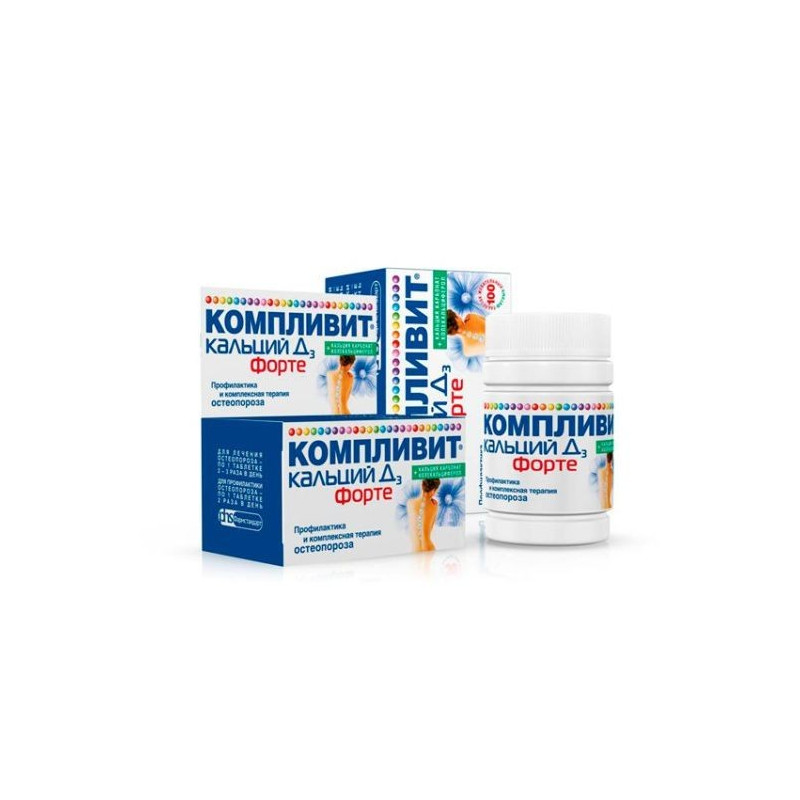



 All payments are encrypted via SSL
All payments are encrypted via SSL
 Full Refund if you haven't received your order
Full Refund if you haven't received your order
- treatment and prevention of Ca deficiency2+ and vitamin D3:
- osteoporosis: menopausal, senile, "steroid", idiopathic, etc. (prevention and addition to specific treatment);
- osteomalacia (associated with impaired mineral metabolism in patients over 45 years old);
- hypocalcemia (including after adherence to diets with refusal to accept milk and dairy products);
- with an increased need for pregnancy and lactation, as well as in children over 12 years of age during the period of intensive growth.
Inside, chew or swallow whole. Doses for adults and children over 12 years old - 1 tab. 2 times a day, in the morning and in the evening, mainly during meals, or individually, depending on the clinical picture.
Constipation, flatulence, nausea, stomach pain, diarrhea. Hypercalcemia and hypercalciuria. Allergic reactions.
- hypersensitivity;
- hypercalcemia (including as a result of primary or secondary hyperparathyroidism);
- hypercalciuria;
- Calcium nephrolourithiasis;
- hypervitaminosis D;
- sarcoidosis;
- osteoporosis due to immobilization;
- Phenylketonuria (contains aspartame);
- pulmonary tuberculosis (active form).
With caution used in renal failure, benign granulomatosis, during pregnancy, during lactation, simultaneously with the administration of glycosides and thiazide diuretics, in children (up to 12 years).
Use during pregnancy and lactation
With caution used during pregnancy, during lactation. During pregnancy, the daily dose should not exceed 1500 mg of Ca2+ and 600 IU of vitamin D3.
Overdose during pregnancy can lead to impaired mental and physical development of the child.
Ca2+ and vitamin D3 penetrate into breast milk.
Application for violations of kidney function
With caution used in renal failure.
With caution used in children (up to 12 years).
During the treatment period, Ca excretion must be continuously monitored2+ with urine and Ca concentration2+ and creatinine in plasma (in the case of calciuria, exceeding 7.5 mmol / day (300 mg / day), you must reduce the dose or stop taking).
Contains aspartame, which is metabolized in the body to phenylalanine, which must be considered in patients suffering from phenylketonuria.
In order to avoid overdose, it is necessary to consider the additional intake of vitamin D3 from other sources. Do not use simultaneously with vitamin complexes containing Ca2+ and vitamin D3.
Elderly people need Ca2+ makes 1.5 g / days, in vitamin D3 - 0.5-1 thousand IU / day.
Symptoms (after taking 200 chewable tablets): thirst and polyuria (as signs of CRF), loss of appetite, nausea, vomiting, constipation, dizziness, weakness, headache, fainting,coma; with prolonged use: calcification of blood vessels and tissues. Laboratory indicators for overdose: hypercalciuria, hypercalcemia (Ca2+ in plasma about 2.6 mmol).
Treatment: rehydration, "loop" diuretics, GCS, calcitonin, bisphosphonates, diet with Ca restriction2+conducting hemodialysis.
Reduces the absorption of bisphosphonates, sodium fluoride and tetracyclines (the interval between intake is at least 2-3 hours).
Increases the risk of developing cardiac glycoside toxicity (ECG and patient condition monitoring is necessary).
Phenytoin, barbiturates, corticosteroids reduce the effect of vitamin D3, vitamin A - toxicity.
GCS reduces the absorption of Ca2+.
Kolestiramin, laxatives (liquid paraffin) reduce the absorption of vitamin D.
Thiazide diuretics increase the risk of hypercalcemia.
Furosemide and other “loop” diuretics increase the excretion of Ca2+ by the kidneys.
